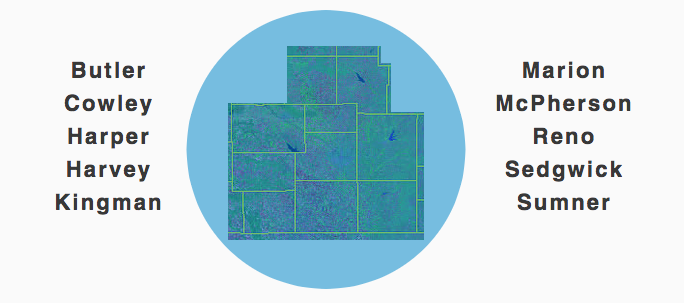WICHITA IS MORE THAN WICHITA
Wichita is a city with most of the restaurants, stores and entertainment options you'd expect in any other decent sized city. But an hour drive gets you deep into the country. It's a sweet spot between city and country — between rural and urban.
This makes a lot of sense when you look at the makeup of Wichita's metropolitan statistical area (MSA), which includes smaller towns like Derby, Bel Aire and Goddard, and its larger regional economy, which includes towns as far away as McPherson, El Dorado and Hutchinson.
These cities aren't Wichita, but they are subject to the ups and downs of Wichita's economy. And Wichita's economy is dependent on the people who live in, and commute from, these smaller cities.
It's time to consider Wichita as more than just Wichita — as a collection of people living in urban, suburban and rural settings, all working to contribute to the regional economy.
WHY MSA MATTERS
Wichita is a big city — especially for Kansas. Population-wise, we're the 50th-largest city in the country at about 389,000. At 49 is New Orleans with 391,000, and at 51 is Cleveland with 385,000.
So if we're bigger than Cleveland — and nearly as big as New Orleans — why do we seem so much smaller? Both cities have professional sports, and New Orleans is a cultural and entertainment hub known across the world. The answer is in our MSA.
While Wichita is in the top 50 in raw population, it's 87th in MSA with about 645,000 residents. New Orleans has over 1.2 million and is in the top 50. Cleveland is even bigger at about 2 million.

"The political boundaries of city limits and county lines don't matter when it comes to economies," says Derby City Manager Kathy Sexton. "What matters is where are the jobs, where are the businesses and where are the transportation routes to get the workers and the products to and from those businesses. And that’s why the region is so important."
Sexton has long worked as the city manager for Wichita's largest suburb. Before that, she worked in the State of Kansas budget office and as assistant county manager for Sedgwick County.
The political boundaries of city limits and county lines don't matter when it comes to economies. What matters is where are the jobs, where are the businesses and where are the transportation routes to get the workers and the products to and from those businesses. And that’s why the region is so important.Kathy Sexton
She says economies flow across city, county and state lines freely. For instance, Kansas City's economy doesn't care about the river separating the states. And when it comes to city size, businesses are far more likely to consider MSA or regional numbers than the populations of specific cities.
"Derby has 24,000 people," she says. "Is that the number people care about if they’re looking at Derby for business? No. Any business is going to look for 'who are our customers, and how far are they willing to drive? And who do we need for employees, and where can we get them?'"
Derby's retail sector has exploded in the past decade, not because it's a large town, but because it can serve a large area. Restaurants and stores in Derby attract shoppers from south Wichita, McConnell Air Force Base, Mulvane, Wellington, Winfield, Arkansas City and more.
While MSA is important, Sexton says the larger regional economy is even more vital for the future of Wichita and the state as a whole. McPherson's success in manufacturing, for instance, is only possible because of the Wichita workforce willing to commute.
"I know people who live in Valley Center who drive to McPherson every day to work at a plant or to run a plant," Sexton says. "I know people in Hutchinson who drive to Derby every day. And Reno County isn’t in the MSA. ... The region is very important to all of us. Derby, Wichita, McPherson, El Dorado, you name it. It's all about the Wichita regional economy. And most of the government units — the cities and the counties — understand that, and we work together routinely on regional issues and communications."
So what does working together look like? And how do cities balance competition for businesses and residents with the collaboration that comes with being a part of the same region?
ACTING AS A REGION
While cities certainly compete for jobs and residents, it's more important for a region to remain competitive, says Andrew Nave, executive vice president of economic development at the Greater Wichita Partnership. He says companies looking to expand or relocate are looking at regions before the communities themselves.

"Companies and folks who are making investments are looking at state levels and regional levels first and foremost," he says. "In the 21st century, you have to compete as broadly as you can."
With Wichita being a part of a larger region, it also helps if there is diversity of jobs, people and lifestyles in that region.
"We're selling a region," Nave says. "And like any good company that offers a wide variety of products and amenities, the more product offerings we have for the marketplace, the better off we are."

This map shows the 10-county regional economy, as defined by the Blueprint for Regional Economic Growth (BREG).
The Partnership has worked on expanding these offerings through the Blueprint for Regional Economic Growth (BREG), which examines 10 counties spanning from McPherson to the Oklahoma border. BREG focuses on fostering economic diversity and growth through workforce education, innovation, logistics, exports and communications.
So far, BREG has identified eight economic clusters that are present in the region: advanced materials, aerospace, agriculture, data services and IT, healthcare, oil and gas, and transportation and logistics.
Sexton says Wichita is large enough to be a player in all of these sectors. But smaller communities like Derby have to find their niche instead of trying to compete with other communities that may have different needs and wants.
"You can’t be all things to all people," she says. "And any time a city thinks they’re going to get what the other guy has up the road, and doesn’t look at it from an economic standpoint or a practical, realistic standpoint, you’re just spinning your wheels and wasting your resources."
When you're part of a regional economy, sometimes it's more important to gain residents than businesses. Derby has worked to improve parks, schools, recreation and libraries to ensure that, no matter where they work, people will want to live in Derby.
Wichita offers neighborhoods and night life that appeal to a wide range of demographics. But people who want open space will likely have to move out of the city. That's where having a diverse region comes into play.
You can’t be all things to all people. And any time a city thinks they’re going to get what the other guy has up the road, and doesn’t look at it from an economic standpoint or a practical, realistic standpoint, you’re just spinning your wheels and wasting your resources.Kathy Sexton
"When you have different communities, you can serve different needs," Sexton says. "Some people love living in a city with their little lot and their close neighbors. Other people want five acres and a horse. Other people want 20 acres and a garden, the bees out back and the chickens with their eggs."
At the same time, the location of these open spaces is becoming ever more important. Marion is a rural town about an hour from Wichita. Sexton says there are houses on the lake there that were paid for with Boeing checks and pensions of people who were willing to drive an hour to work.
Further out, rural towns haven't been so fortunate.
"Some little cities have dried up and gone away," Sexton says. "I grew up on a farm, so I get it. It’s sad when the little towns are even littler than when you grew up there. There are some cities that can thrive in rural America, but a lot of the little bitty ones aren’t thriving because people keep moving toward the cities. If you’re within an hour drive of your job, you’re good. But if you’re farther away from that, it’s going to be hard — as a community — to survive."
Big picture, Wichita is an economic engine for the region and the state with an hour-drive radius of customers and employees. Even bigger picture, Wichita is a piece of the I-35 corridor that connects Kansas City to Oklahoma City and Dallas. Go out even farther and Wichita is a part of the modern, global economy. As transportation and manufacturing change, so will the region and the radius it serves.
WORKING TOGETHER
Besides providing the variety of communities needed to support the regional economy, these smaller cities often work with Wichita and Sedgwick County to create a better region for everyone.
The Derby Fire & Rescue Department works with Sedgwick County Fire District #1 to cover parts of the county that are close to Derby. In exchange, Sedgwick County responds to structure fires in Derby. Derby Police often get help from specialists in the Wichita Police Department to deal with unique issues like bomb threats.
Derby also works with smaller communities like Rose Hill. Derby building inspectors also inspect homes in Rose Hill and issue building permits. Derby has also been helping the town with court clerk functions.
Sexton says working together requires a mutual respect and a realization that every city has a sense of independence, but also must work with the larger region to ensure a strong economy. There are 20 cities in Sedgwick County, each with its own independent government elected by the people who live there.
We depend on each other and we have to respect what each other is doing and make space in our lives for diversity of thought, diversity of how you want to live, diversity of property and diversity of businesses. There’s a lot of value in knowing that, if you want to be strong economically in the future, you can’t let a petty rivalry hold you back.Kathy Sexton
"I am keenly aware of the pressures and sensitivities that smaller communities have of being part of the metro, but also wanting their own identity," Nave says.
But Nave says it's also about cooperating as a region. We don't have a major airport in every community. We have one that serves the region. Similarly, we don't have universities and community colleges in every community.
"At the end of the day, a plant or facility or office is physically going to be in one spot," he says. "Communities want to see that investment, but there's a spirit of cooperation in this part of Kansas like there never has been before."
Nave says Wichita Mayor Jeff Longwell has been a great example of this sense of cooperation. He has even joined presentations to meet with prospective companies looking to locate to communities outside of Wichita.
"I think there's a really good, healthy spirit of cooperation right now in south-central Kansas," Nave says.
Sexton says this spirit of cooperation and looking at the bigger picture are keys to future economic success in the region.
"It is important that we keep the long-term and the big picture in our sights," she says. "We understand that we can be fiercely independent and proud of our own towns, but in order to have a strong Kansas economy, and certainly a strong regional economy, we depend on each other, and we have to respect what each other is doing and make space in our lives for diversity of thought, diversity of how you want to live, diversity of property and diversity of businesses. There’s a lot of value in knowing that, if you want to be strong economically in the future, you can’t let a petty rivalry hold you back."
Sexton says it's also important to recognize the Wichita region's place in the larger, global economy.
"We are a region as an economy, but we’re still a small regional economy. We’re not even a million," she says. "So when you look at your other cities you sometimes compare to, we’re still small, population-wise. When you’re between Dallas and Denver and Omaha and Kansas City, you have to know your strengths and play to your strengths because you cannot be all things to all people."
The future of our economic region is the future of Wichita — their fates are tied in all of the Four Challenges. Wichita is more than Wichita, and we have to all be on board to make the future work.